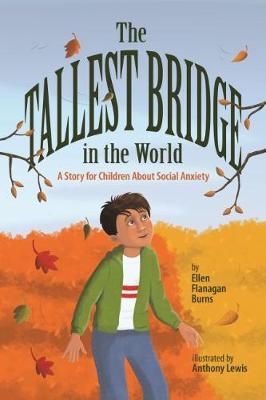
The Tallest Bridge in the World
A Story for Children About Social Anxiety
Seiten
2017
Magination Press, (American Psychological Association) (Verlag)
978-1-4338-2760-0 (ISBN)
Magination Press, (American Psychological Association) (Verlag)
978-1-4338-2760-0 (ISBN)
- Titel z.Zt. nicht lieferbar
- Portofrei ab CHF 40
- Auch auf Rechnung
- Artikel merken
Are they staring at me because I look weird?
Does my voice sound funny?
What if I mess up in my presentation—will everyone laugh at me?
What if I fail at swim tryouts?
I’ll be so embarrassed!
Thomas has always been a bit shy, but recently his nervousness has been getting in the way of the things he would like to do. He realizes it may be time to talk to someone. With the help of his parents and a therapist, Thomas learns how social anxiety affects his brain, and everyday tools and strategies to cope with and combat it.
Includes a Note to Readers with more information on social anxiety in preteens, and the cognitive-behavioral strategies you can use to cope with it.
From the Note to Readers:
If you have social anxiety, you probably know that all that worrying about what other people might think of you can be pretty exhausting. It can hold you back from joining in on some pretty cool activities. You might be super focused on all the embarrassing things that could happen if you join a club or a team, and that might make you want to avoid those social events altogether. This can lead to a spiral effect where you choose not to participate in social activities because you’re afraid of what might happen, but then you don’t get the benefits of participation in those social activities, like building relationships with friends, opportunities for fun, and learning experiences that take place in those social activities. You might also be left feeling disappointed in yourself for not taking part.
Does my voice sound funny?
What if I mess up in my presentation—will everyone laugh at me?
What if I fail at swim tryouts?
I’ll be so embarrassed!
Thomas has always been a bit shy, but recently his nervousness has been getting in the way of the things he would like to do. He realizes it may be time to talk to someone. With the help of his parents and a therapist, Thomas learns how social anxiety affects his brain, and everyday tools and strategies to cope with and combat it.
Includes a Note to Readers with more information on social anxiety in preteens, and the cognitive-behavioral strategies you can use to cope with it.
From the Note to Readers:
If you have social anxiety, you probably know that all that worrying about what other people might think of you can be pretty exhausting. It can hold you back from joining in on some pretty cool activities. You might be super focused on all the embarrassing things that could happen if you join a club or a team, and that might make you want to avoid those social events altogether. This can lead to a spiral effect where you choose not to participate in social activities because you’re afraid of what might happen, but then you don’t get the benefits of participation in those social activities, like building relationships with friends, opportunities for fun, and learning experiences that take place in those social activities. You might also be left feeling disappointed in yourself for not taking part.
Ellen Flanagan Burns is a school psychologist and the author of Nobody's Perfect: A Story for Children About Perfectionism and Ten Turtles on Tuesday; A Story for Children About Obsessive-Compulsive Disorder. She devotes her writing to helping children overcome anxiety. She believes that children's books can be a powerful therapeutic tool and supports cognitive-based interventions for children with anxiety-related issues. Anthony Lewis graduated from the Liverpool School of Art, UK, with a first class honors degree in illustration. Since then, Anthony has illustrated more than 400 children's books for publishers worldwide.
| Erscheinungsdatum | 04.07.2017 |
|---|---|
| Illustrationen | Anthony Lewis |
| Zusatzinfo | Full-color illustrations |
| Sprache | englisch |
| Maße | 152 x 229 mm |
| Themenwelt | Kinder- / Jugendbuch ► Sachbücher |
| Geisteswissenschaften ► Psychologie ► Allgemeines / Lexika | |
| Geisteswissenschaften ► Psychologie ► Entwicklungspsychologie | |
| ISBN-10 | 1-4338-2760-3 / 1433827603 |
| ISBN-13 | 978-1-4338-2760-0 / 9781433827600 |
| Zustand | Neuware |
| Haben Sie eine Frage zum Produkt? |
Mehr entdecken
aus dem Bereich
aus dem Bereich


